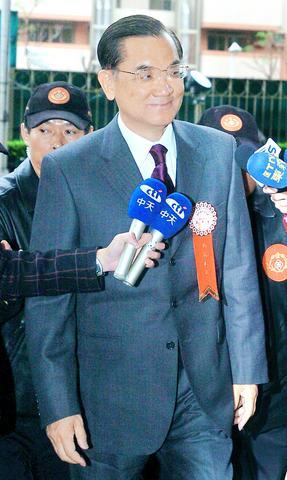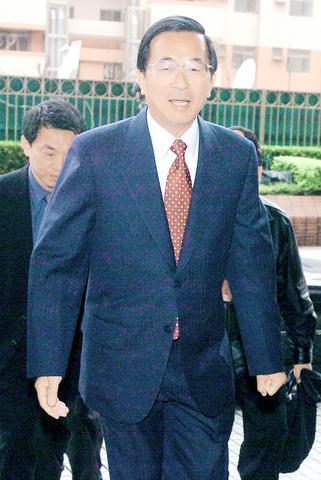The Democratic Progressive Party's (DPP) presidential candidate Chen Shui-bian (
"Mr. Lien's plan to end conscription is so simplistic it smacks of childishness, and will sacrifice Taiwan's security. His purpose is simply to cheat young voters," Chen said.

PHOTO: LIAO CHEN-HUI, TAIPEI TIMES
Lien retorted, however, that Chen's criticisms reflected a lack of understanding of military affairs consequent upon his not performing military service.

PHOTO: LIAO CHEN-HUI, TAIPEI TIMES
The two traded their accusations during yesterday's televised policy speech program, broadcast by China Television and hosted by the Central Election Commission. Each candidate had 30 minutes in which to outline his platform.
Chen first stressed that a fully professional military was something he had advocated throughout the past decade, but that it was a goal that needed to be achieved step by step, rather than in what he called an improvised manner.
"The former KMT government endeavored to hollow out the nation's financial base. Now its presidential candidate wishes to return to such strategies; he intends to hollow out the nation's defensive base," Chen said.
Chen said the creation of a fully professional military required three phases. First, he said, the best soldiers must be selected, and the number of troops reduced from 385,000 to 270,000.
In the second stage, there would be both enlisted and conscripted troops, in a 3:2 ration. Only in the third stage would conscription be completely abolished, he said.
"Military service is an obligation required by the Constitution. Any idea to change this therefore requires a Constitutional amendment, a process which takes years. It is not as simple as Mr. Lien's childish plan," Chen said.
To defend his promise to achieve military service reform by 2008, Lien further explained yesterday that after his victory in the March 20 presidential election, his administration would facilitate the passage of a bill creating a fully professional military service within one year and pass a special budget of NT$60 billion to put the policy into effect as quickly as possible.
"Since we must develop a defensive strategy with advanced technology and elite personnel, as well as allow our young generation to continue to contribute to society, we will require that all young men of draft age participate in a military training course lasting three months," Lien said.
According to Lien's plan, Taiwan's fully professional military would require 120,000 troops, 80,000 officers and NCOs and 50,000 graduates of military schools to make up a high-quality, defensive force.
"Mr. Chen says my plan is unrealistic. I can say that the reason he cannot accept it is because he lacks sufficient understanding of military affairs, especially because he never did military service," Lien said.
Chen was exempted from military service because of a malformed elbow as a result of falls in his childhood which prevents his arm from being stretched out fully. He did however do three months basic training in the reserves.
On a separate note, Lien then pledged that if he wins the election, he will donate all his earnings and campaign subsidies to underprivileged group, poor households and the unemployed.
Chen called on the public to take no notice of Lien's promise, because, he said, his donations would amount to less than the KMT was likely to waste implementing its campaign promises.
"A fully professional military service will cost hundreds of billions of dollars, while Lien's donations won't exceed a few hundred million," he said.

The CIA has a message for Chinese government officials worried about their place in Chinese President Xi Jinping’s (習近平) government: Come work with us. The agency released two Mandarin-language videos on social media on Thursday inviting disgruntled officials to contact the CIA. The recruitment videos posted on YouTube and X racked up more than 5 million views combined in their first day. The outreach comes as CIA Director John Ratcliffe has vowed to boost the agency’s use of intelligence from human sources and its focus on China, which has recently targeted US officials with its own espionage operations. The videos are “aimed at

STEADFAST FRIEND: The bills encourage increased Taiwan-US engagement and address China’s distortion of UN Resolution 2758 to isolate Taiwan internationally The Presidential Office yesterday thanked the US House of Representatives for unanimously passing two Taiwan-related bills highlighting its solid support for Taiwan’s democracy and global participation, and for deepening bilateral relations. One of the bills, the Taiwan Assurance Implementation Act, requires the US Department of State to periodically review its guidelines for engagement with Taiwan, and report to the US Congress on the guidelines and plans to lift self-imposed limitations on US-Taiwan engagement. The other bill is the Taiwan International Solidarity Act, which clarifies that UN Resolution 2758 does not address the issue of the representation of Taiwan or its people in

US Indo-Pacific Commander Admiral Samuel Paparo on Friday expressed concern over the rate at which China is diversifying its military exercises, the Financial Times (FT) reported on Saturday. “The rates of change on the depth and breadth of their exercises is the one non-linear effect that I’ve seen in the last year that wakes me up at night or keeps me up at night,” Paparo was quoted by FT as saying while attending the annual Sedona Forum at the McCain Institute in Arizona. Paparo also expressed concern over the speed with which China was expanding its military. While the US

SHIFT: Taiwan’s better-than-expected first-quarter GDP and signs of weakness in the US have driven global capital back to emerging markets, the central bank head said The central bank yesterday blamed market speculation for the steep rise in the local currency, and urged exporters and financial institutions to stay calm and stop panic sell-offs to avoid hurting their own profitability. The nation’s top monetary policymaker said that it would step in, if necessary, to maintain order and stability in the foreign exchange market. The remarks came as the NT dollar yesterday closed up NT$0.919 to NT$30.145 against the US dollar in Taipei trading, after rising as high as NT$29.59 in intraday trading. The local currency has surged 5.85 percent against the greenback over the past two sessions, central